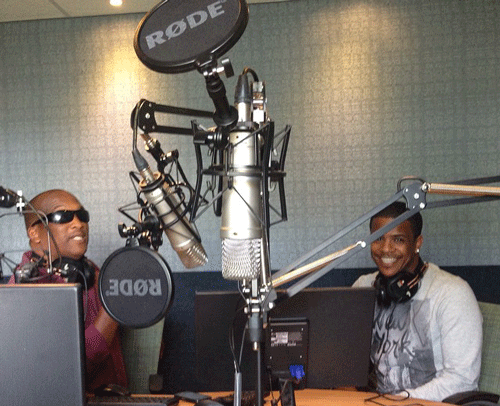
THE name Kenni Gamble might not ring a bell to most music lovers today, but he was one of the finest club deejays-cum-rapper to emerge after the country’s independence in 1980. The good news is that his faithful fans and those from the older generation whom he mesmerised on the decks in the 80s might get a chance to hear him again, this time on the airwaves.
By Albert Masaka

Speaking from his base in South Africa, Kenni Gamble, born Kenni Gambo, told The Standard Style that he was willing to give fans another taste of his prowess on the decks if given a slot on local radio to complete his musical journey.
While he was content with producing and writing songs, as pressing business commitments were limiting his time, Gamble said he loved Zimbabwe and would want to please the music fans once more.
“Maybe Comfort Mbofana [Star FM manager] or another station manager has a vacancy,” he said.
“It would crown a complete and amazing journey on my part. I love Zimbabwe, it’s my fatherland and the place where I grew up. God bless Zimbabwe always.”
Gamble said the biggest disappointment in his career was when the late veteran broadcaster, Ishmael Kadungure wanted to recruit him for a slot on Radio 3 [now Power FM], but the move failed because he held South African citizenship.
“He heard me at Bretts [a popular night club in Harare then] one night and I guess he was impressed. I tried explaining that my father was Zimbabwean and that by descent, so was I, but dual citizenship was not allowed and Kadungure was a principled man, I understood and moved on,” he said
- Chamisa under fire over US$120K donation
- Mavhunga puts DeMbare into Chibuku quarterfinals
- Pension funds bet on Cabora Bassa oilfields
- Councils defy govt fire tender directive
Keep Reading
While appreciating the current crop of DJs, he criticised them for relying too much on technology, unlike in the past when they had to use vinyl records.
A vinyl record, commonly known as a record, is an analogue sound storage medium in the form of a flat polyvinyl chloride with an inscribed, modulated spiral groove. It was popular in the 1980s.
Gamble said he got inspiration from legendary radio personalities like Josh Makawa, James Makamba and Hilton Mambo as well as musician Fred Zindi.
The highlight of Gamble’s career was the popular weekend sessions at the upmarket Bretts Night Club in Harare from 1983 to 1988, which attracted even the attention of the late minister David Karimanzira who visited the club to witness for himself why the street near the club was blocked with traffic on Saturdays.
“At one time, Karimanzira came to see who was causing traffic jams along Stanley Avenue every Saturday afternoon. He couldn’t believe it when he discovered that it was a mere DJ,” Gamble said.
He said the show, which was targeted at the teens, grew into the biggest and most consistent gig on the entertainment calendar, also drawing adults.
“I was known as Kenni Gamble, due to a misprint by a newspaper advertising consultant, but I loved it because that was the name of a famous songwriter. Those who knew me well simply called it The Kenny G Show.
After identifying the local teen scene afternoon sessions as his niche market, Gamble dominated the weekend afternoon gigs in the country, having started his career at the little-known Omar Khayyam Restaurant in Masvingo in 1982. “I think fans loved the high-powered and non-stop hits as well as mixes, plus the fact that I would rap freestyle in the middle of a gig long before Tupac and Biggie,” he said.
“Caleb Thondhlana had a special Wednesday radio slot where he featured rappers and they would clash at Bretts.
Fans knew that at a Kenny G gig you would sweat, dance till you drop.”
Gamble said competition was “wicked” back then, with the more seasoned DJs like Josh Makawa, Fungai Marange, Kudzi Marudza, Peter Johns, Biscuit (Obediah Moyo), Mickey D and later on people like Blowout Disco to a lesser extent.
However, he was forced to let go of an afternoon session at Archipelago Nite Club to a resident DJ.
“It was very disappointing but I continued as I was building the brand. When Stanley’s Night Club became Bretts Night Club, Steve Doran agreed to give me a slot during the afternoon sessions,” he said.
Gamble said he was fortunate in that he negotiated a healthy door percentage at Bretts because the management thought it would never work.
The afternoon show dubbed the PM Session or the Kenny G show became an instant hit and also became a training ground for young DJs who would later rule the roost on national radio stations.
“My sessions at Bretts introduced many new names and these included Darlington Masenda, Tichafa Matambanadzo popularly known as Tich Matazz and Hosiah Sengende, among others,” he said.
“I often gave these guys an opportunity to play before a packed house and it is from there that they built careers. I’m happy, I played my part,” he said.
Gamble was born in Cape Town on December 7 1964, being the fifth child of a Zimbabwean, Takaendesa Gambo Matirinde and South African Elsie Botha-Gambo. His father left Zimbawe for South Africa in the 1940s where he got married to his mother.
The legendary DJ runs Medialand, a business-to-business publishing company that also owns the Cape Metro.











